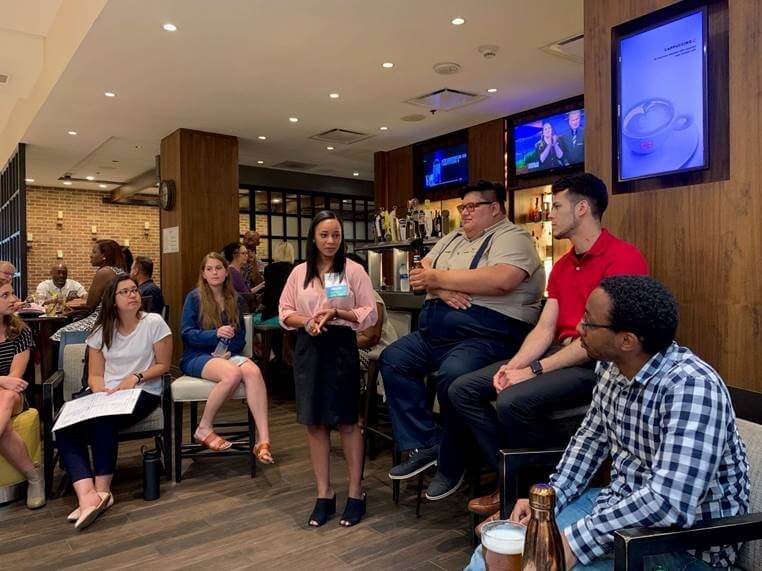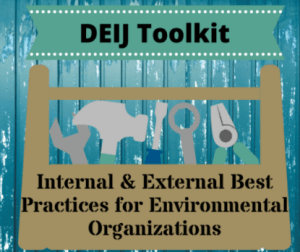The Role of Coalitions in Propelling Diversity, Equity, Inclusion, and Justice Work Forward
This blog post was written by Mariah Davis (Choose Clean Water) and Ellen Underwood (Coalition for the Delaware River Watershed).
Coalitions, collaboratives, and networks play an integral role in promoting new ideas, building connections, and exploring new avenues for support. As the only national nonprofit whose sole purpose is to connect and strengthen the nationwide network of local water protectors, River Network has used our role to educate ourselves and groups across the network on topics such as equity, diversity, and inclusion (EDI)*. We are not alone in this work; our partners Choose Clean Water (CCW) and the Coalition for the Delaware River Watershed (CDRW) have created resources, priorities, and welcoming, safe environments in which to discuss these topics.
Click here for more on River Network’s EDI journey and organizational history, and we hope you take away important lessons by reading CCW and CDRW’s stories of their approaches to this work below.
*River Network intentionally begins with the “E” of equity; this work is also referred to as “DEIJ” below, indicating diversity, equity, inclusion, and justice.
Choose Clean Water Coalition
Mariah Davis, Senior Policy and Campaigns Manager
For the last five years, the Choose Clean Water Coalition has demonstrated our commitment to protecting communities facing environmental injustices. At the core of our work is supporting our more than 260 member organizations to become more diverse, equitable, and culturally inclusive. As a first step in this work, we created the DEIJ in Action Guide, a comprehensive tool for organizations and funders to advance their DEIJ goals. We’ve organized and shared statements condemning acts of racial injustices against Black, Latinx, Indigenous, and People of Color (BIPOC) and denounced attacks on our democracy. We spoke in solidarity for George Floyd, Breonna Taylor, and the countless lives lost at the peak of the pandemic to include Asian American and Pacific Islander people. If you’re asking yourself why this work is relevant to our work for clean water, it’s simple — there’s a longstanding history of racism in the environmental movement.
History shows us that inequalities in policy and decision- making have resulted in historically underrepresented communities suffering disproportionate impacts from pollution. To help foster a safer, more equitable Chesapeake Bay, the Coalition has provided trainings, educational opportunities, and safe spaces to discuss challenges and identify solutions. At the federal level, we’ve advocated for the passage of the Environmental Justice for All Act and continue to coordinate transparent discussions with members of Congress dedicated to this work. We’ve pushed Coalition members to unpack how we, as environmental organizations, need to take responsibility for owning our impact. Each day, we use our voices to dismantle harmful misconceptions about our relationship with the environment and advocate for reinvestments in BIPOC communities. From our work to reduce stormwater pollution and runoff from agricultural lands, we have the ability to ensure we are protecting everyone’s wellbeing. We’re identifying opportunities in policy making to prioritize green infrastructure projects in cities most impacted by heat island effects and climate change. We advocate for equitable grant making, increased access to green spaces, and connect Coalition members with initiatives that liberate Black communities through land ownership.

A gathering of CCW’s Young Professionals of Color mentorship program.
And while our external DEIJ work is critical, our internal work to unpack white supremacy culture within our organizations is just as important. Oftentimes, our BIPOC colleagues carry a disproportionate burden to lead DEIJ efforts. As a Coalition, we are investing in BIPOC colleagues by creating safe spaces to network, share challenges, learn, build professional development skills, and find healing. Our Young Professionals of Color Mentorship Program is one of the only spaces in the Bay community that provides free customized trainings and mentorship to BIPOC colleagues.
While we have made great strides to embody the principles of DEIJ, much work remains. We look forward to continuing these efforts in collaboration with many key partners including the River Network and our sister coalition, the Coalition for the Delaware River Watershed. If we are to reach our collective clean water goals, we must prioritize our DEIJ work and not rest until all communities can enjoy the multitude of benefits from clean rivers, streams, and Chesapeake Bay.
Coalition for the Delaware River Watershed
Ellen Underwood, Engagement Coordinator
In 2012, the Coalition for the Delaware River Watershed (CDRW) was formed to protect and restore the land and waters in the Delaware River Basin. CDRW amplifies the collective power of 170+ member organizations to advocate for a healthier and protected watershed with an inclusive, unified voice. The Coalition convenes member and non-member organizations, builds capacity, coordinates communications, and advances policy at federal and state levels. Through this work, the Coalition envisions a Delaware River Basin recognized as one of America’s Great Waters, providing clean water, healthy habitat, and public access to all members of our Watershed community.
The Delaware River Basin provides drinking water, recreation, economic opportunity, and more to millions of people living in the watershed. Despite this, many communities have experienced environmental injustices including polluted water, illegal chemical dumping, the building of hazardous waste disposal sites, and lack of access to the outdoors. Communities of color and low-income communities bear a disproportionate burden and impact of these injustices. Additionally, the mainstream environmental movement is a product of years of racism and segregation, dating back to the origins of the conservation movement. Decades of excluding minority voices has led to misconceptions about who cares about the environment, perceiving that people of color only care about environmental issues when related to Environmental Justice, and harmful approaches to “collaboration.”
These issues have been prevalent and ubiquitous for decades, and we all must work to address them. As with many other organizations in recent years, CDRW recognized it did not incorporate authentic awareness and integration of DEIJ related issues in its conception. In truly recognizing the harmful history and current injustices facing our watershed community, as well as heeding the call of the importance of DEIJ and harnessing our capacity for leadership, Diversity, Equity, Inclusion, and Justice was formally adopted as a concerted effort of the Coalition in 2018. CDRW is committed to advancing DEIJ within our internal organization, network structure, partnerships, processes, and policy goals to ensure that all communities share equitably in the benefits of clean water, land, and public access.
DEIJ is a continued, consistent, and ever-evolving effort. Led by our DEIJ Workgroup, CDRW has taken a multifaceted approach to DEIJ, providing a platform for Coalition members to do the internal work necessary to foster an inclusive culture, dismantle structures of oppression, and remove barriers to participation by providing spaces for discussion and educational opportunities. We also work towards engaging more members in the DEIJ journey as well as applying a DEIJ lens to all of our undertakings rather than approaching it as a separate initiative. Since our DEIJ Priority was adopted, we have incorporated DEIJ sessions into our Annual forum and workplan meetings into our Annual Member meeting to create collective engagement and direction in advancing DEIJ in the watershed. Additionally, in 2019, CDRW developed an Internal and External DEIJ Toolkit for organizations to use when embarking on their DEIJ Journey. In our DEIJ workgroup we convene twice a month to learn through discussion topics as well as plan and identify opportunities to advance DEIJ work. The Coalition is about to start an exciting year-long journey with Tribesy Consultants to do an organizational assessment, develop a DEIJ Lens and test to create more effective accountability and integration of DEIJ, and develop a roadmap to advance on issues such as inclusive and diverse relationship building, improving external engagement, and effectively identifying and advancing policy.
We and many other organizations throughout the watershed, are taking this critical work seriously and aim to integrate every aspect internally, but we honor the learning curve and challenges that exist. In pursuing this work organizations must be prepared to be uncomfortable and make mistakes. Waiting until an organization feels as though it will do everything perfectly is a sure way to never start at all. Instead, organizations must rise to the challenge of reflecting upon missteps, learning to ask questions, and evaluate previously held assumptions, all of which are parts of developing a growth mindset. This takes a considerable amount of emotional intelligence and cultivating it within your organization will be a key driver of success.
No matter where you are on your DEIJ journey, it is important to remember that the internal work is an ongoing process that should be integrated throughout your journey. Oftentimes organizations will focus primarily on external engagement and increasing diversity of staff, but doing so without a solid internal DEIJ foundation can lead to tokenism and an unsafe environment for staff and members with marginalized identities. It is critical to address unconscious bias towards those with marginalized identities, dismantle white supremacy (especially in its less obvious forms), and foster a healthy, inclusive workplace culture.
Often we’ll hear folx say “I don’t have time for this, or this doesn’t apply to the work we do.” If this thought comes up for you, we challenge you to address that as the first step in your DEIJ journey. A quote that deeply resonates with us and is valuable to consider is, “When we say ‘I don’t have time to add DEIJ to my already full plate,’ that’s saying, ‘I don’t have time to stop harming you.’”
DEIJ is valuable, integral, and an imperative for all individuals, organizations, and work.
 We invite you to explore the resources we have created to support individual and organizational DEIJ efforts as well as learn more about the Coalition’s commitments and efforts on our DEIJ webpage. Our Internal and External Toolkits are a great resource for more details on the learnings and approaches discussed here. Feel free to reach out to us with any questions!
We invite you to explore the resources we have created to support individual and organizational DEIJ efforts as well as learn more about the Coalition’s commitments and efforts on our DEIJ webpage. Our Internal and External Toolkits are a great resource for more details on the learnings and approaches discussed here. Feel free to reach out to us with any questions!
To learn more, contact Ellen Underwood.





